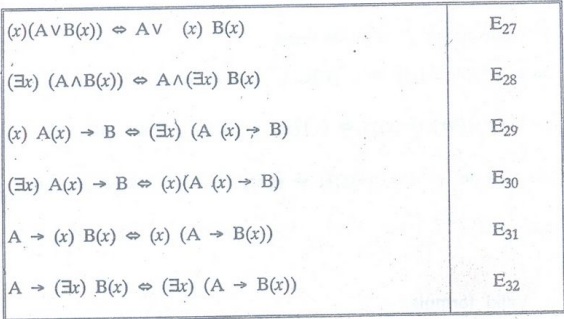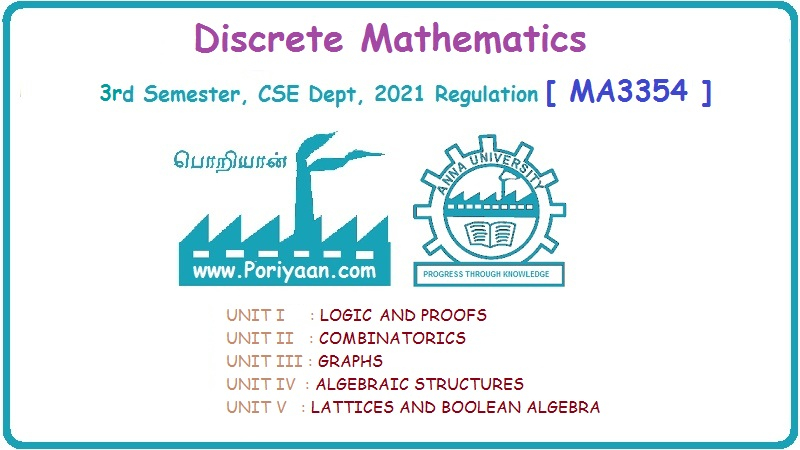Discrete Mathematics: Unit I: Logic and Proofs
Logical Equivalences and Implications for Quantified Statements
Logic and Proofs - Discrete Mathematics
Let A and B be any two predicate formulas defined over a common universe denoted by the symbol E.
LOGICAL
EQUIVALENCES AND IMPLICATIONS FOR QUANTIFIED STATEMENTS
EQUIVALENCES AND
IMPLICATIONS
Let
A and B be any two predicate formulas defined over a common universe denoted by
the symbol E. If, for every assignment of object names from the universe of
discourse E to each of the variables appearing in A and B, the resulting
statements have the same truth values, then the predicate formulas A and B are
said to be equivalent to each over E.
If
E is arbitrary, then we say that A and B are equivalent, that is A↔B.
The
definition of implication can be extended in the same way. It is assumed that
the same object names are assigned to the same variables throughout both A and
B.
Four
types of equivalences
"all
true" {∀x, P (x)} ↔ {┐(Ǝx) (┐P (x))} "none
false"
"all
false" {(∀x), (P (x))} ↔ {┐(Ǝx) (P (x))}
"none true"
"not
all true" {┐(∀x), (P(x))} ↔ {(Ǝx)( ┐P(x))}
"atleast one false"
"not
all false" {┐(∀x), (┐P(x))} ↔ {(Ǝx) (P(x))}
"atleast one true"
Valid
formulas
A
formula A is said to be valid in E written A in E if, forevery assignment of
object names from E to the corresponding variables in A and for every
assignment of statements to statement variables, the resulting statements have
truth value T. We shall frequently use some of the equivalences and
implications given in the following table.
Table 1.

Table 2.

Example 1.
Show that (∀x)
(P(x)) → (Ǝx) (P(x)) is a logically valid statement.
Solution :
If
∀x
P(x) is true in some particular universe, then the universe has atleast one
object c in it and P(b) is a true statement for every b in the universe. In
particular P(c) must be true. Thus (Ǝx) (P(x)) is true. Therefore
(∀x) (P(x)) → (Ǝx) (P(x))
is a valid satement.
Remark:
If all men are giants, then some men are giants is not a valid statement. If
the universe contains no men, then ∀x M(x) → G(x) is true,
while (Ǝx) (M(x) ^G(x)) is false, where M(x) : x is a man, G(x): x is a giant.
Thus
(∀x)
(M(x) → G(x)) → (Ǝx) (M(x)) ^ G(x))
is
not logically valid.
Example 2.
Show that (∀x)
(P(x)) V (∀x) (Q(x)) → (∀x)
(P(x)) V Q(x)) is logically valid.
Solution :
Consider
the case when (∀x) (P(x)) v (∀x)
(Q(x)) is true. Since this is a disjunction of if-statements, one of the
statements (∀x) (P(x)) and (∀x)
(Q(x)) must be true.
If
(∀x)
(P(x)) is true, then for every object b in the universe, P(b) is true, and
hence P(b), v Q(b) is true. Similarly when (∀x) (Q(x) is true, P(b)
v Q(b) is true for every object b. In both the cases P(b) v Q(b) is true for
all b in the universe.
Therefore
(∀x)
(P(x) v Q(x)) is true and
(∀x)
(P(x)) V (∀x) (Q(x)) → (∀x)
(P(x) v Q(x))
is
a valid statement.
Example 3.
Show by counterexample
(∀x) (P(x)) v Q(x)) → (∀x)
(P(x)) V (∀x) (Q (x)) is not valid.
Solution:
Now consider the following statement
(∀x)
(P(x) v Q(x)),
where
P() : x is an even integer,
Q(x)
: x is a prime integer and the universe is {2, 4, 6, 8, 3, 7, 11}
For
this universe, the statement (∀x) (P(x) v Q(x)) is
true, but both (∀x) (P(x)) and (∀x)
(Q(x)) are not true. So (∀x) (P(x) V (Q (x)) is
true,
(∀x)
(P(x)) V (∀x) (Q(x)) is not true. Thus
(∀x)
(P(x) v Q(x) → (∀x) (P(x)) v (∀x)
(Q(x))
is
not a valid statement.
Example 4. Prove that the
statements
(a) (∀x)
(P(x)) → P(y)
(b) P(y) → (Ǝx) (P(x))
are valid statements. (y represents
any one of the objects in the given universe)
Solution :
(a)
The logical validity of the first statement follows immediately from the fact
that if (∀x) (P(x))) is true, then P(b) is true
for every object b in the universe and hence it is true for any specific object
y in the universe.
(b)
The logical validity of the second statement is a consequence of the meaning of
the existential quantifier. The statement (Ǝx) (P(x)) is true if and only if
there exists atleast one object in the universe for which P(x) is true. Therefore,
if P(y) is true, then (Ǝx) P(x)) is true.
Discrete Mathematics: Unit I: Logic and Proofs : Tag: : Logic and Proofs - Discrete Mathematics - Logical Equivalences and Implications for Quantified Statements
Related Topics
Related Subjects
Discrete Mathematics
MA3354 3rd Semester CSE Dept | 2021 Regulation | 3rd Semester CSE Dept 2021 Regulation
